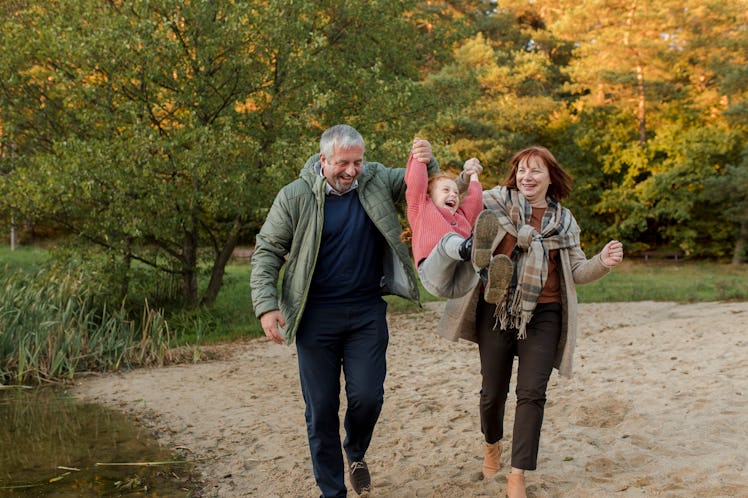5 Scientifically Backed Benefits To Grandmas And Grandpas
The research-backed benefits of grandparents go beyond the mediocre candy in their pockets.

As much as science explains why you’re more likely to want to kill your in-laws when they’re involved in child-rearing, science also says don’t do that because grandparents are actually really good for everyone involved. There’s an evolutionary reason humans are the only species (with the exception of a few whales) that have grandmas and grandpas, and it’s not just so dads can watch their spouses and mothers engage in a feud of a lifetime. The researched-back benefits of having grandma and grandpa involved go far beyond butterscotch candies, and might even leave a better taste in your mouth when they decide to “visit” an extra day.
Grandparents Help Raise Happy Adults
Kids who grow up to have greater emotional closeness with grandparents are less likely to be depressed as adults, one study shows. The research looked at 374 grandparents and 356 adult grandchildren and included seven waves of data collection between 1985 and 2004, and found that the affinity grandparents and adult grandchildren had for each other reduced depressive symptoms on both sides. Although this study looked at adult grandkids, a similar study of children ages 11 to 16 years echoed these findings. And 16-year-olds are rarely happy about anything.
Grandpa Might Determine Your Kid’s Life Expectancy
Though the body of research on grandfathers remains limited compared to grandmothers, a 2011 study found that the age when their grandchildren were born could actually determine a kid’s life expectancy. The research revealed that the older a child’s paternal grandpa was, the longer telomeres they’re born with — a structure of nucleotide sequences at each end of a chromosome that is often compared to the plastic ends of a shoelace. Telomeres get shorter the older people get, often causing age-related illnesses. The longer these are at birth, the slower this process is. So thank Pop Pop for the ends of your kid’s laces.
Grandpas Get Better With Age
Many studies examine the role grandmothers play with grandchildren, but a 2012 study that looked at more than 5,000 grandparents suggests that grandfathers step up around age 70. “Although the latter spend more time with grandchildren than the former, the difference in participation shrinks steadily after 60,” Norwegian sociologist and study co-author Knud Knudsen said in a statement. “Past 70, the grandfather usually takes the lead.” However, the data showed that this was more likely to occur when grandpas had a living partner (she prefers to be referred to as grandma). Not only do grandpas get more involved with age, but it also seems grandparents become a better tag-team with time as well. Now they have another excuse to compare themselves to fine wines.
Being A Grandparent Makes Them Live Longer Too
Grandparents who babysit grandkids live longer than same-age adults without child-rearing responsibilities, according to recent research. The study, which looked at 500 adults ages 70 and older, showed that grandparents who babysat regularly had a 37% lower mortality risk than adults who did not. Researchers suspect this has something to do with staying mentally active and having a purpose, but perhaps a steady diet of cheddar bunnies doesn’t hurt either. Although your kids may make you feel like you’re aging rapidly, the opposite is true for your parents and in-laws, and the fountain of youth is just a sippy cup.
But There Can Be Too Much Of A Good Thing
Moms and dads worried about their in-laws moving in have science on their side. A study revealed that when grandmothers spent one day a week caring for children, it reduced their Alzheimer’s risk. But five or more days a week doing this actually increased their risk of neurodegenerative disorders. Getting the balance just right is as good for everyone involved as it is crucial for your sanity.
In the end, the biggest upside of grandparents is that they’re not looking to come out of retirement to put you out of a job as a parent. They’re looking to give you a break — and maybe a little alone time to make more grandkids.
This article was originally published on